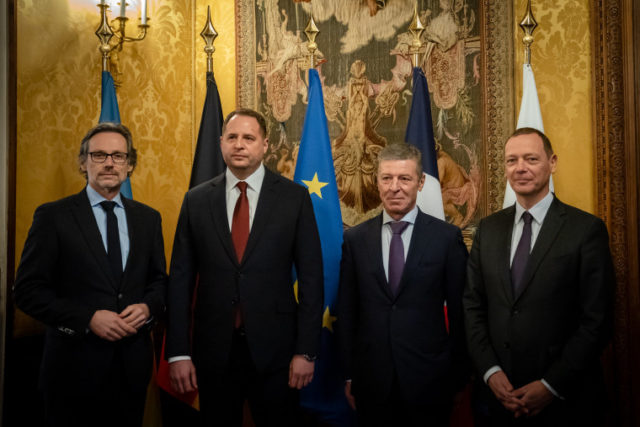
Moscow, Kyiv Differ Over Goals in Relaunching Normandy Process (Part One)
Publication: Eurasia Daily Monitor Volume: 19 Issue: 9
By:

On January 26, in Paris, senior political advisors to the Russian, Ukrainian, German and French heads of state and government convened to “reanimate” (such is the term in circulation) the quadrilateral “Normandy” process of consultations.
The meeting, lasting eight and a half hours (almost twice longer than anticipated), marks a breakthrough of sorts, in that all sides have publicly acknowledged for the first time since 2015 that: 1) The four sides differ substantially with each other in their respective interpretations of the Minsk “agreements,” no longer attempting this time to paper them over; 2) Differing interpretations have to be acknowledged as such in order to be dealt with and resolved if possible; 3) The parties will meet again in two weeks’ time, in Berlin, with a view to working out a common interpretation of the Minsk “agreements” to accelerate a political settlement.
The short “declaration of the advisors” issued by the Elysée Palace (Elysee.fr, January 26) barely reflects that potential breakthrough. It is, however, attested by the Russian and Ukrainian presidential envoys, Dmitry Kozak and Andriy Yermak, respectively, in their separate briefings following this marathon session.
Kozak spoke of the “breakthrough” with a mixture of frustration (acknowledging that Russia could not impose its own reading of the Minsk “agreements” upon Ukraine after seven years) and fresh hope (anticipating that the meeting in Berlin could).
This meeting took place in the shadow of Russia’s massive military buildup in Ukraine’s vicinity. The Russian, German and French sides apparently overruled Ukraine’s attempts to bring this matter onto the Paris meeting’s agenda. Kyiv had to accept their argument that Russia’s troop movements around Ukraine are a matter for the ongoing discussions between Moscow and Washington and between Moscow and the North Atlantic Treaty Organization (NATO); whereas the Normandy forum deals with the conflict in Ukraine’s Donbas only. Moscow, in particular, holds that “these two situations are not related to each other” (Ukrinform, Interfax, TASS, January 26).
The Ukrainian side went into this meeting with three priority objectives. First it sought to revise (in all but name) the Russian-imposed Minsk “agreements.” Ukraine, according to Yermak, needs an “inventorization [stock-taking] of where we are in terms of implementing the Minsk agreement. […] We will ‘walk through’ the Minsk agreements in their entirety, as we have clear-cut positions and answers on every clause. […] We will fulfill the Minsk agreements only in Ukraine’s interests and only in accordance with international law.” Second, Kyiv wanted a “durable and unconditional ceasefire in Donbas, regardless of any differences over interpreting the Minsk agreements.” And third, it strived to persuade the other three sides to hold a Normandy summit at the level of heads of state and government soon (Ukrinform, January 24–28).
President Volodymyr Zelenskyy and his government have attempted to revise (reinterpret) the Minsk “agreements” ever since the December 2019 Normandy summit. To accept those documents, provided that they conform with Ukraine’s interests and international law, is tantamount to radically revising them, since they purport to override both international law and Ukraine’s national sovereignty. Moscow has now for the first time hinted, through Kozak at this meeting, that it might discuss differing interpretations. This would seem to mark a success for Kyiv, subject to confirmation at the next Normandy meeting.
The advisors’ declaration out of the Elysée Palace (see above) includes Kyiv’s desideratum of “unconditional adherence to the ceasefire regardless of differences over implementing the Minsk agreements.” With this, the Normandy forum actually recognizes the existence of such differences, potentially legitimizing them, which is a success for Kyiv. However, the advisors’ declaration connects the ceasefire with adherence to the July 2020 military agreement between Kyiv and Russia’s proxies in Donetsk-Luhansk. The Ukrainian side soon backtracked on that agreement, which Kozak wants to be reinstated (see below).
Finally, Zelenskyy’s quest for a Normandy summit serves mainly a pretext for meeting with Russian President Vladimir Putin there. Moscow would probably demand political concessions from Kyiv in return for a summit. Zelenskyy and Yermak promised to incorporate the “special status” for Donetsk-Luhansk and the Steinmeier Formula into Ukraine’s legislation as a price for the December 2019 Normandy summit (the last to be held thus far). Kyiv, however, proved unable and ultimately unwilling to fulfill those promises. Moscow, Berlin and Paris in unison demand fulfillment as a precondition to holding another Normandy summit (see below).
Zelenskyy and Yermak characterize the Paris meeting as “constructive” and “positive” in terms of Ukraine’s objectives going into this meeting (President.gov.ua, January 27, 28). Faced with Russia’s military buildup around Ukraine, they view the resumption of the quadripartite Normandy process as a potentially stabilizing factor.



